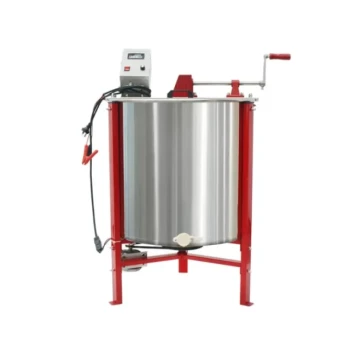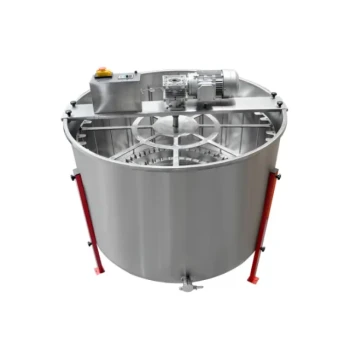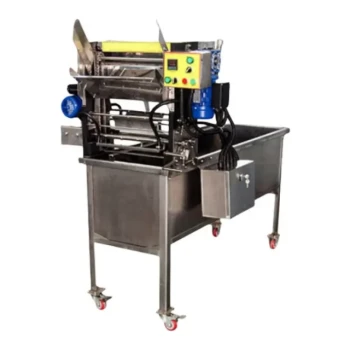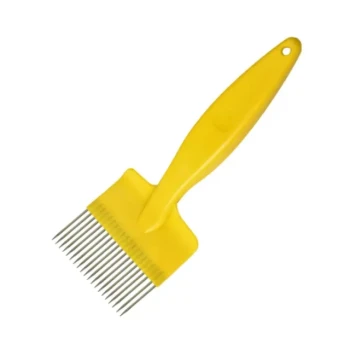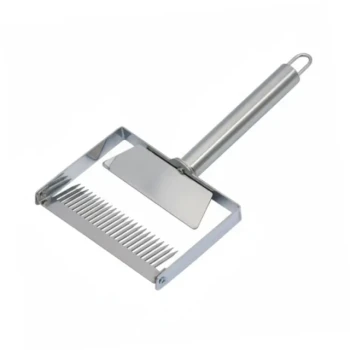Extracting honey from the comb is a two-part process that can be accomplished with simple kitchen tools or specialized beekeeping equipment. First, you must remove the protective wax cappings the bees place on each cell. Second, you use force—either by crushing, pressing, or spinning—to separate the liquid honey from the wax comb itself.
The method you choose depends entirely on your goal. For a small batch, crushing and straining the comb is simplest. For a serious hobbyist who wants to preserve the delicate wax comb for the bees to reuse, a centrifugal extractor is the only effective option.
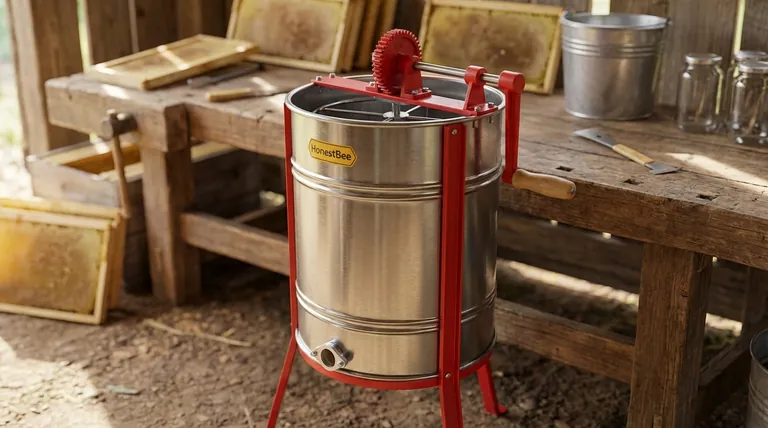
The Foundational Step: Uncapping the Comb
Before any honey can be extracted, you must break the seal the bees have placed on each cell. This is a non-negotiable first step for any method.
Why Uncapping is Necessary
Bees fill the hexagonal wax cells with honey and, once it has the correct moisture content, they seal it with a fresh layer of beeswax. These "cappings" protect the honey and must be sliced off to allow it to flow out.
Common Uncapping Tools
For small-scale operations, a clean, long serrated bread knife works well. You can also warm the knife in hot water to help it slice through the wax more easily.
Beekeepers often use specialized tools like an uncapping fork (a fork with sharp tines to pierce the cappings) or a heated electric knife designed for this specific purpose.
The Uncapping Process
Hold the frame vertically over a food-grade bucket or large pan. Using your knife, slice off the very top layer of wax cappings. Try to cut just deep enough to expose the honey cells, letting the cappings fall into the container below to be processed later.
Choosing Your Extraction Method
Once uncapped, you have three primary ways to get the honey out of the comb.
Method 1: The Crush and Strain (Simplest Approach)
This is the most accessible method and requires no special equipment, but it destroys the honeycomb in the process.
Simply cut the uncapped comb out of the frame and place it into a large, food-grade bucket or bowl. Use a clean tool, like a potato masher or a large spoon, to crush the comb thoroughly, breaking up all the cells.
Finally, pour the honey and crushed wax mixture through a double-layer of cheesecloth or a fine-mesh strainer into a clean jar. The straining process can be slow as the honey is thick.
Method 2: The Press (A Step Up in Volume)
A press uses mechanical force to squeeze the honey from the comb. This is essentially a more efficient version of the crush and strain method.
After uncapping and crushing the comb, the mixture is placed into a honey press or a standard fruit press. As you turn the handle, a plate applies pressure, forcing the honey out through a filter and into a collection vessel. This method also destroys the comb.
Method 3: The Extractor (For Reusable Comb)
Using a centrifugal extractor is the most efficient method for larger harvests and the only one that preserves the comb. Preserving the comb allows you to return the empty frames to the hive, saving the bees immense time and energy as they do not have to rebuild it from scratch.
Uncapped frames are placed vertically inside the extractor, which is a large drum. As you spin the extractor (either with a hand crank or an electric motor), centrifugal force flings the honey out of the cells and onto the interior wall of the drum. The honey then runs down the wall and collects at the bottom, where it can be drained through a spout.
Understanding the Trade-offs
Choosing a method involves balancing cost, effort, and your long-term beekeeping goals.
Equipment Cost and Scale
The crush and strain method is effectively free, making it ideal for a first-time harvest or processing a single frame. A press represents a modest investment, while an extractor is a significant purchase best suited for beekeepers managing multiple hives.
Comb Preservation
This is the most critical difference. Bees expend a tremendous amount of energy to produce wax and build comb. By using an extractor, you give them a massive head start for the next season. The crush and strain and press methods destroy the comb, forcing the bees to rebuild it completely.
Honey Clarity
Extracted honey is generally cleaner from the start, containing fewer suspended wax particles. Honey from the crush and strain method often requires more thorough or repeated straining to achieve the same level of clarity.
Making the Right Choice for Your Goal
After extraction, your honey should be strained one last time and stored in airtight jars at room temperature to prevent crystallization.
- If your primary focus is a small, one-time harvest: Use the crush and strain method for its simplicity and zero equipment cost.
- If your primary focus is efficiency and supporting your bees: Invest in an extractor to preserve the comb and streamline future harvests.
- If your primary focus is processing a moderate amount of honey without a large investment: A fruit press can serve as an effective middle ground between manual crushing and a dedicated extractor.
Ultimately, turning a frame of honeycomb into a jar of pure, liquid honey is one of the most rewarding parts of beekeeping.
Summary Table:
| Method | Best For | Key Equipment | Preserves Comb? |
|---|---|---|---|
| Crush & Strain | Small, one-time harvests | Knife, bowl, strainer | No |
| Press | Moderate volume, efficiency | Honey press or fruit press | No |
| Extractor | Large harvests, reusable comb | Centrifugal extractor | Yes |
Ready to streamline your honey harvest?
Whether you're a commercial apiary managing hundreds of hives or a distributor supplying serious hobbyists, the right equipment makes all the difference. HONESTBEE supplies high-quality, durable beekeeping supplies and extraction equipment through our wholesale-focused operations.
We help you:
- Save Time & Labor with efficient, scalable extraction solutions.
- Maximize Honey Yields while preserving your bees' valuable comb.
- Grow Your Operation with reliable equipment built for commercial use.
Contact our wholesale team today to discuss your needs and get a quote: Get in Touch
Visual Guide
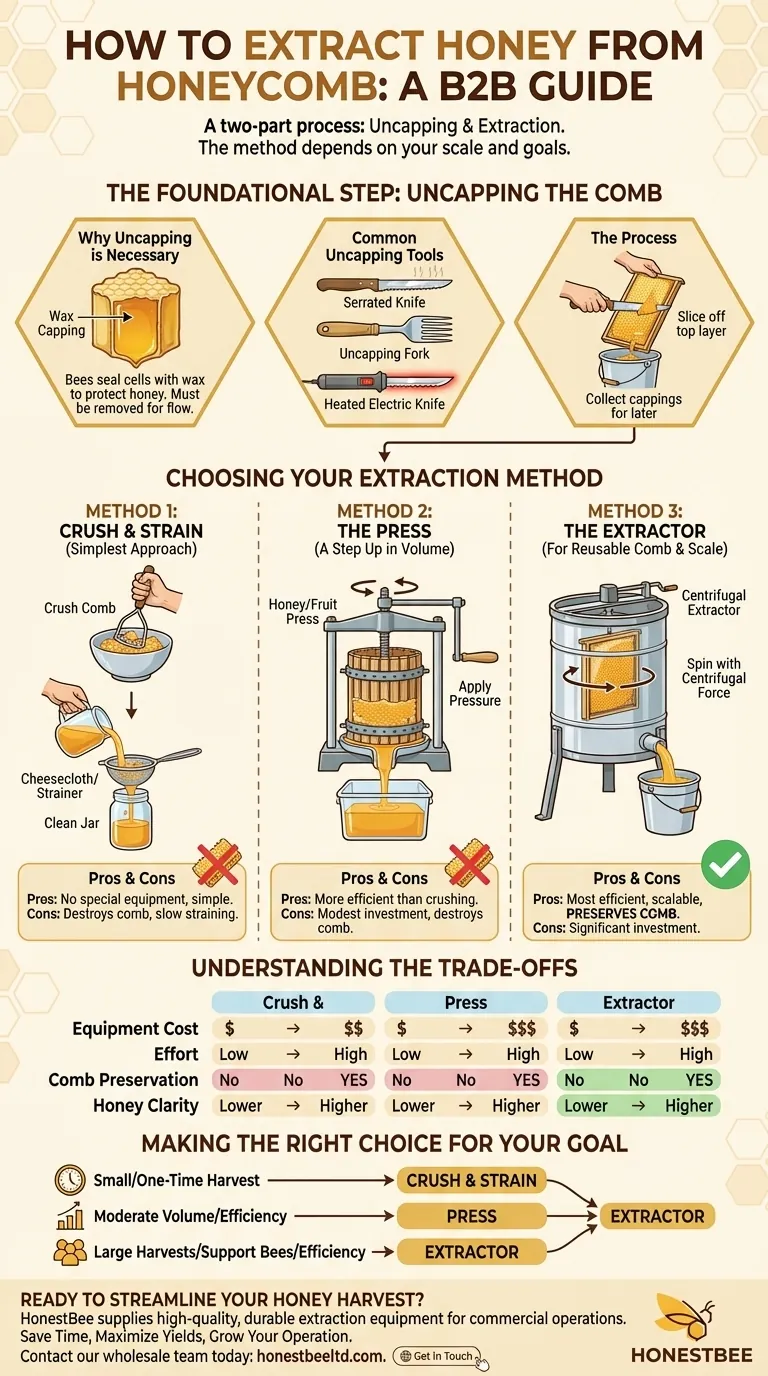
Related Products
- Stainless Steel 3 Frame Manual Honey Extractor Spinner for Bee Honey Extraction
- 6 Frame Manual Stainless Steel Honey Extractor Beekeeping Equipment
- Plastic Hand Crank 2 Frame Honey Extractor Low Price
- electric honey extractor honey centrifuge 3 frame honey extractor stainless steel honey frame extractor
- HONESTBEE 3-Frame Manual Acrylic Honey Extractor
People Also Ask
- Which type of honey extractor, electric or manual, is faster? Maximize Your Apiary Efficiency and Speed
- What operational benefits do motorized honey extractors provide? Scale Your Harvest Efficiency
- How do you manually extract honey? Choose the Best Method for Your Hive
- How to extract honey by hand? A Guide to Crush & Strain vs. Manual Extractors
- What are the disadvantages of a manual honey extractor? Overcome Efficiency Bottlenecks in Your Apiary







